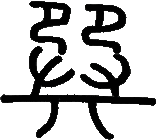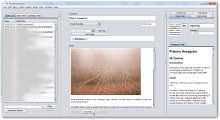The Sequence – for all the remarkable patterns it contains – is about the simplest ‘tool’ you can add to your interpretive repertoire. No complicated operations are required to find the preceding hexagram, and no concept more profound than steps along the road: ‘You pass through this to reach here.’
To reach Hexagram 57, Subtly Penetrating, you pass through 56, the Traveller. The Sequence (a Wing full of insights – do not let dismissive commentators tell you otherwise) says,
‘The Traveller has no place where he is accepted, and so Subtly Penetrating follows. Subtly Penetrating means entering in.’
The contrast is clear enough. A traveller is ‘waterproofed’ against what he travels through: he doesn’t start thinking in the native language, or adopt the local culture as his own. The locals don’t accept him as one of them; he preserves his own ways and his own purpose, which is somewhere further along the road – not in this temporary halt. Neither the traveller nor his hosts will be much changed by the encounter. But with Subtly Penetrating, you are part of the environment; the environment is part of you. Full mutual permeability.
This doesn’t show why Subtly Penetrating would follow – but if you consider Hexagram 56 as a whole, especially its climactic fifth line, you see that this integration is what the Traveller is looking for. He wants to come home; 57 is how he can.
While it’s easy to relate to this through comparing a tourist with a local, it’s worth stretching the imagination to encompass the ancient perspective. Hexagram 56 refers to the story of King Hai, leader of a nomadic people, who spectacularly broke the rules of the place where he stayed and suffered the consequences. Hexagram 57 is named for those seals of office, received from the ruler as signs that you are trusted to partake in his authority. And that authority in turn comes from heaven – is part of the harmonious order of all things. So the move from Travelling to Subtly Penetrating is also a move from the nomadic to the fully civilised life – integrated and in harmony with heaven and earth.
This is actually a particularly interesting ‘corner’ of the Sequence, if you look at it in terms of paired hexagrams. 55-56 moves to 57-58. First there are two hexagrams with strong and clear historical resonance: the garrison city of Abundance, Feng, where Wu assumed responsibility for the mandate; the travels and misadventures of Hai, the nomadic king. Then a pair of doubled-trigram hexagrams, xun and dui – doubled wind/wood and doubled lake.
This pattern’s actually occurred once before: hexagrams 49-50, the revolution and establishment of the new dynasty, followed by 51-52, doubled thunder and doubled mountain. The theme there, I think, is of handling and integrating the tremendous change that has just occurred, by finding and holding to the unbroken line of what is sacred. The ‘trigram helpers’ (as Stephen Karcher would call them) come to support the change.
Again at 55-58, a hexagram pair describing major historical moments is followed by a pair of doubled trigrams. The theme for 49-52 is change and continuity; I think that for 55-58, it’s individual responsibility and integration into context. Hai’s behaviour at Yi, seducing the local ruler’s wife, was beyond the pale, but Wu’s at Feng was really no less shocking: he planned to overthrow a dynasty, and took it on himself to forego the prescribed period of mourning for his father.
Both Wu and Hai stepped outside the laws of their environment, breaking the harmony of individual and context. Both ‘took a lot on themselves’ – the nuclear hexagram of both 55 and 56 is 28, Great Exceeding, with its powerful image of the beam that buckles under the weight it carries. Where is the supporting structure that could sustain it?
 So in this context, the work of 57-58, Subtly Penetrating and Opening, seems to be one of reintegrating and reconnecting – finding a place for individual identity and purpose. In Hexagram 58, that happens through explicit, lively interaction and exchange between separate entities; in 57, it’s ‘hidden away’, a matter of individual nature coming to expression and finding its place as part of the whole. That inner nature can be described as your seal – as in the ancient character xun – and the seal itself is how you receive your own mandate in life.
So in this context, the work of 57-58, Subtly Penetrating and Opening, seems to be one of reintegrating and reconnecting – finding a place for individual identity and purpose. In Hexagram 58, that happens through explicit, lively interaction and exchange between separate entities; in 57, it’s ‘hidden away’, a matter of individual nature coming to expression and finding its place as part of the whole. That inner nature can be described as your seal – as in the ancient character xun – and the seal itself is how you receive your own mandate in life.
The Image says,
‘Wind follows wind, Subtly Penetrating.
A noble one conveys mandates and carries out the work.’
Mandates are not just a private communication between heaven and the individual, but how the world works; mandate flows through and between people and gets things done.
It’s no longer ‘the individual against the world’ (56) or ‘the individual who must carry the world’ (55) – it’s more that what you carry within you becomes part of everything, and everything carries the message – or meaning – or direction. ‘My seal’ or ‘the ruler’s seal’ – it’s the same seal. You don’t become less ‘you’; you simply notice that your essence is as much ‘out there’ as it’s ‘in here’. Subtly Penetrating means entering in.
(Afterword: I just noticed that the relationship between 49-52 and 55-58 is even more elegant than I’d realised.
Hexagrams 49 and 50 combine the trigram li, first on the inside and then the outside, with dui/xun. Then they’re followed by the hexagrams of doubled zhen and gen.
Hexagrams 55 and 56 combine the trigram li, first on the inside and then the outside, with zhen/gen. Then they’re followed by the hexagrams of doubled xun and dui.)










A lot of words about the “invisible” forces in our lives that permeate us. Granted, that thought applies in different ways to different circumstances, but why conclude those specifics for others? Should not each person inquire of the Book for themselves, and learn to recognize their own meanings?
Of course. I’d never ‘conclude specifics for others’ about any hexagram.